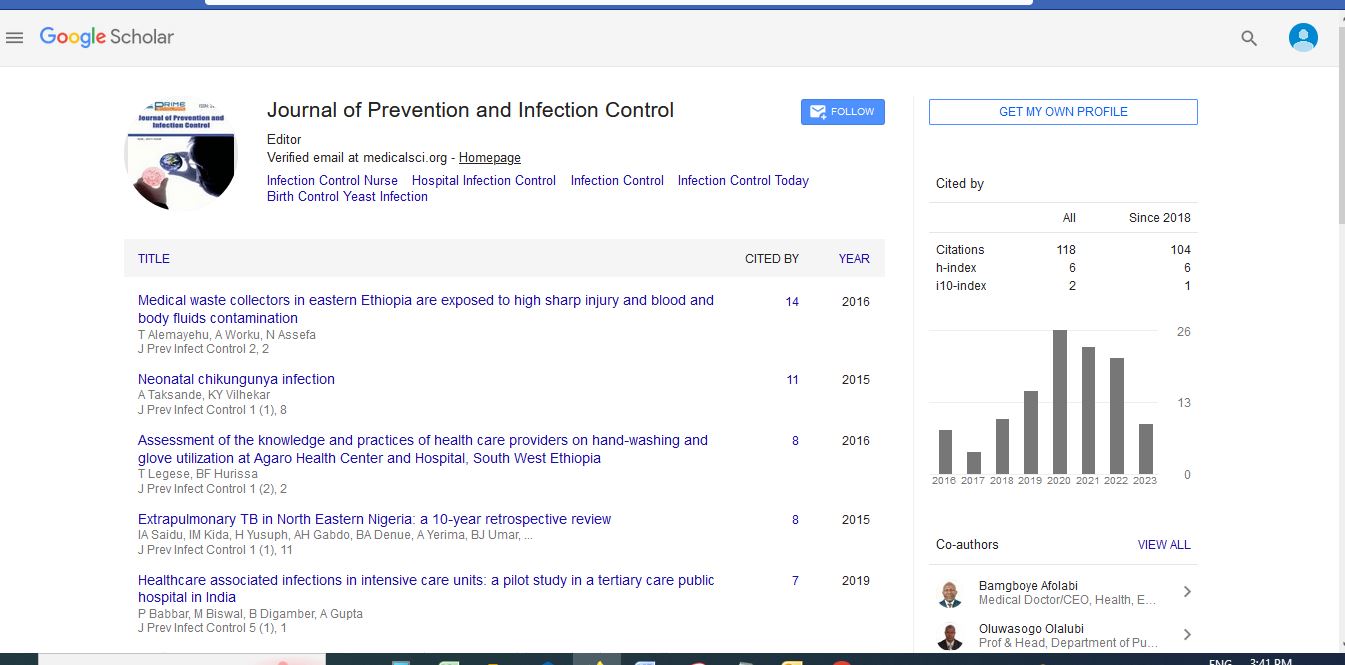Perspective - (2023) Volume 9, Issue 4
The Globalization of Communicable Diseases: Challenges and Responses
Abron Aroni*
Department of Medicine, University of Calidonia, USA
*Correspondence:
Abron Aroni,
Department of Medicine, University of Calidonia,
USA,
Email:
Received: 29-Nov-2023, Manuscript No. IPJPIC-23-18550 ;
Editor assigned: 01-Dec-2023, Pre QC No. IPJPIC-23-18550 (PQ);
Reviewed: 15-Dec-2023, QC No. IPJPIC-23-18550 ;
Revised: 20-Dec-2023, Manuscript No. IPJPIC-23-18550 (R);
Published:
27-Dec-2023, DOI: 10.36648/2471-9668-9.4.35
Introduction
In an increasingly interconnected world, the globalization of
communicable diseases has emerged as a critical concern for
global health security. Communicable diseases, also known as
infectious diseases, traverse borders effortlessly, facilitated by
rapid transportation, trade, and human mobility. This phenomenon
poses intricate challenges for healthcare systems worldwide,
demanding concerted efforts in surveillance, prevention,
and response strategies to mitigate their impact. Globalization,
marked by intensified international travel, migration, and trade,
has accelerated the spread of communicable diseases. Infectious
agents, whether viruses, bacteria, or other pathogens, capitalize
on the ease of movement to breach geographical boundaries
swiftly. Outbreaks such as influenza pandemics, epidemics, and
the recent COVID-19 pandemic exemplify the speed at which
communicable diseases can disseminate across continents, defying
conventional containment measures. Several factors contribute
to the swift propagation of communicable diseases on
a global scale. Urbanization, dense populations, inadequate
healthcare infrastructure, and climate change amplify the vulnerability
to disease outbreaks. Furthermore, microbial resistance
to antimicrobial drugs poses a formidable challenge, complicating
treatment options and heightening the risk of widespread
infections. The globalization of communicable diseases not only
poses threats to public health but also imparts significant socioeconomic
repercussions. Outbreaks disrupt economies, strain
healthcare systems, and lead to productivity losses due to illness
and mortality.
Description
Preparedness and collaboration are key pillars in mitigating the
impact of global disease transmission. Investing in research and
development of vaccines and treatments, enhancing laboratory
capacities, and bolstering healthcare infrastructure are essential
components of preparedness efforts. Additionally, fostering partnerships
between governments, healthcare sectors, and communities
enhances the collective ability to respond swiftly to emerging
infectious threats. Numerous challenges persist in combating
the globalization of communicable diseases. Fragmented healthcare
systems, inadequate resources, and barriers to information
sharing hinder effective responses. Addressing these challenges
demands a multifaceted approach that integrates political commitment,
resource allocation, and international cooperation.
Strengthening health systems, improving access to healthcare,
and prioritizing preventive measures are pivotal in mitigating the
impact of global disease transmission. Particularly vulnerable are
regions with limited access to healthcare and resources, where
the impact of disease outbreaks can be disproportionately severe,
exacerbating existing disparities. Addressing the challenges
posed by the globalization of communicable diseases necessitates
robust surveillance and response mechanisms. International
organizations such as the World Health Organization (WHO),
in collaboration with national health agencies and other stakeholders,
play a pivotal role in monitoring disease outbreaks, coordinating
responses, and disseminating vital information. Early
detection, rapid response, and information sharing among countries
are crucial in containing the spread of infectious diseases.
Conclusion
The globalization of communicable diseases underscores the
interconnectedness of the modern world, necessitating collaborative
and proactive approaches in addressing emerging health
threats. Heightened vigilance, preparedness, and robust response
mechanisms are imperative in safeguarding global health
security. As the world navigates an era of unprecedented connectivity,
concerted efforts in surveillance, prevention, and response
stand as essential safeguards against the adverse impact of communicable
diseases on humanity. Particularly vulnerable are regions
with limited access to healthcare and resources, where the
impact of disease outbreaks can be disproportionately severe,
exacerbating existing disparities.
Citation: Aroni A (2023) The Globalization of Communicable Diseases: Challenges and Responses. J Prevent Infect Control. 9:35.
Copyright: © 2023 Aroni A. This is an open-access article distributed under the terms of the Creative Commons Attribution License, which permits unrestricted use, distribution, and reproduction in any medium, provided the original author and source are credited.

